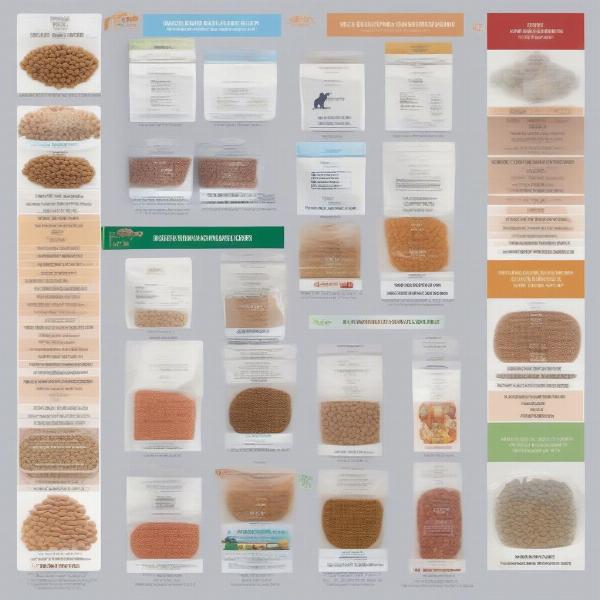A high protein, low carb dog food diet is gaining popularity among pet owners. But is it right for your furry friend? This guide dives deep into the benefits, risks, and considerations for switching your dog to a high protein, low carb diet. We’ll explore which dogs benefit most, how to choose the right food, and potential challenges you might encounter.
Understanding the High Protein, Low Carb Diet for Dogs
Many commercial dog foods are high in carbohydrates, often derived from grains like corn and wheat. A high protein, low carb diet, on the other hand, emphasizes protein sources like meat, poultry, and fish, while minimizing carbohydrates. This mimics the natural diet of canids, which are primarily carnivores.
 Examples of High-Protein Dog Foods
Examples of High-Protein Dog Foods
Benefits of a High Protein, Low Carb Diet
A high protein diet can offer several benefits for dogs, including:
- Muscle maintenance and growth: Protein is essential for building and repairing muscle tissue, crucial for active dogs and those recovering from injury.
- Weight management: High protein diets can promote satiety, helping dogs feel fuller for longer and potentially aiding in weight loss.
- Improved energy levels: While carbohydrates provide quick energy, protein offers sustained energy throughout the day.
- Healthy skin and coat: Protein is vital for healthy skin and a shiny coat.
- Better blood sugar control: Lowering carbohydrates can help regulate blood sugar levels, particularly beneficial for dogs with diabetes.
Is a High Protein, Low Carb Diet Right for Every Dog?
While a high protein, low carb diet can be beneficial for many dogs, it’s not a one-size-fits-all solution. Certain breeds and individuals may thrive on this diet, while others might require a different nutritional approach. Consult your veterinarian before making any significant dietary changes, especially if your dog has pre-existing health conditions like kidney or liver disease. hearty dog food can be a great option for some dogs, but always check with your vet.
Choosing the Right High Protein, Low Carb Dog Food
Selecting the right high protein, low carb dog food requires careful consideration of the ingredients. Look for:
- High-quality protein sources: The first few ingredients should be named meat, poultry, or fish, not meat by-products.
- Limited carbohydrates: Check the guaranteed analysis for low carbohydrate percentages.
- Avoidance of fillers: Fillers like corn, wheat, and soy offer little nutritional value.
- Added vitamins and minerals: Ensure the food is complete and balanced, providing all the necessary nutrients. dry grain free dog food can be a good starting point for this type of diet.
Potential Challenges and Considerations
Switching to a high protein, low carb diet may present some challenges:
- Digestive upset: Some dogs experience digestive upset, such as diarrhea or vomiting, when transitioning to a new diet. Introduce the new food gradually.
- Cost: High-quality, high protein dog foods can be more expensive than traditional kibble.
- Kidney or liver issues: In rare cases, excessively high protein diets can exacerbate existing kidney or liver problems.
Conclusion
A high protein, low carb dog food diet can offer numerous benefits for certain dogs. best dog food for weimaraner and strongheart dog food are just examples. However, it’s crucial to carefully consider your dog’s individual needs and consult with your veterinarian before making any dietary changes. Choosing the right food and monitoring your dog’s health closely are essential for ensuring a successful transition to a high protein, low carb diet.
FAQ
- Is a high protein diet safe for puppies? Puppies have different nutritional needs than adult dogs. Consult your veterinarian about the appropriate diet for your puppy.
- How do I transition my dog to a high protein, low carb diet? Gradually introduce the new food over several days, mixing it with the old food.
- What are some signs of protein deficiency in dogs? Signs can include weight loss, muscle atrophy, and a dull coat.
- Can a high protein diet cause kidney problems? While rare, excessively high protein can exacerbate existing kidney issues. Consult your vet.
- Are all high protein dog foods the same? No, quality varies greatly. Look for high-quality protein sources and avoid fillers.
- How much protein does my dog need? This depends on various factors, including age, breed, and activity level. Consult your veterinarian.
- What are some good sources of protein for dogs? Meat, poultry, fish, and eggs are excellent protein sources. best dog food for aussiedoodles often prioritize these ingredients.
About ILM Dog
ILM Dog (https://ilmdog.com) is your trusted resource for comprehensive information on dog care, encompassing breed selection, health, training, nutrition, grooming, and product recommendations. We connect dog owners worldwide with expert advice and practical tips to foster happy and healthy canine companions. Contact us at [email protected] or +44 20-3965-8624 for personalized guidance.